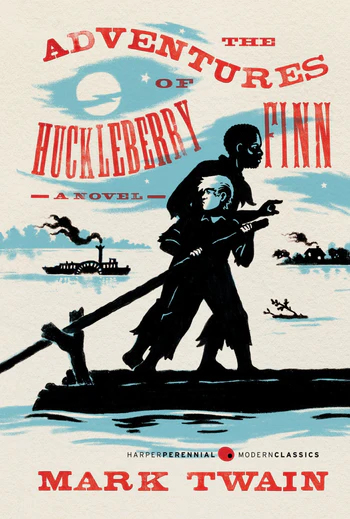The Adventures of Huckleberry Finn
Mark Twain, who was born Samuel L. Clemens in Missouri in 1835, wrote some of the most enduring works of literature in the English language, including The Adventures of Tom Sawyer and The Adventures of Huckleberry Finn. Personal Recollections of Joan of Arc was his last completed book—and, by his own estimate, his best. Its acquisition by Harper & Brothers allowed Twain to stave off bankruptcy. He died in 1910. ... Read more Read less
“Persons attempting to find a motive in this narrative will be prosecuted," Twain wrote to preface his novel The Adventures of Huckleberry Finn. “Persons attempting to find a moral in it will be banished;persons attempting to find a plot in it will be shot.” Originally published in 1884, Mark Twain’s The Adventures of Huckleberry Finn was met with mixed critical reception and even denounced for “offending propriety.” Despite more than a century of weathering literary, historical, and scholarly rebuke, this enduring novel from America’s greatest humorist holds a prominent place in the canon of American literature;Hemingway once wrote that Huckleberry Finn is the novel from which “all modern American literature comes. . . . There has been nothing as good since.” Set in pre-Civil War Missouri and traversing the whole Mississippi River region, Twain’s sequel to his picaresque novel The Adventures of Tom Sawyer follows Huck as he stages his own death to escape his alcoholic father and sets off on an odyssey marked by comedy, danger, and adventure. He soon encounters Jim, the enslaved man working for Huck’s erstwhile guardians, the Widow Douglas and her sister Miss Watson. Jim had run away after overhearing the ladies discuss selling him, and Huck and Jim set sail on a raft down the Mississippi, headed for the Free State of Illinois. Twain's piquant humor finds full expression in this nineteenth-century literary classic, and Huck's frank, boyish narration, told in the vernacular of his time, offers true merriment. But despite Twain's disavowal, the story’s moral center becomes inarguably apparent when Jim is caught and Huck—after one of the most infamous struggles of conscience in American literature—vows to help his friend escape. In Huck Finn, Twain wrote, "a sound heart and a deformed conscience come into collision and conscience suffers a defeat." Huck's journey through nature and “sivilization,” and what he learns about human nature is as poignant today as in Twain’s own time. Central to the American experience, a staple of classrooms, and a cultural touchstone, The Adventures of Huckleberry Finn offers timeless insights into the transition from childhood to adulthood, cruelty and prejudice, and the human condition itself.











